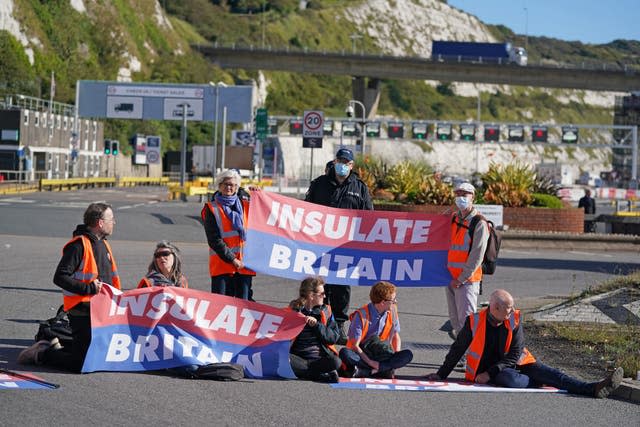Three days of Insulate Britain protests cost almost £900,000, High Court told
Three days of Insulate Britain protests had an “economic cost” of almost £900,000, the High Court has been told.
Activists from the Extinction Rebellion offshoot have blocked major roads on more than a dozen days since September 13.
Demonstrations which took place in different junctions on the M25 and A20 on September 13, 15 and 24, were “incredibly dangerous” and “unpredictable”, according to National Highways.
The protests, one of which lasted for over seven hours, had an estimated cost of £883,962, court documents reveal.

It came as part of a written submission by the agency’s barrister, who was seeking continuation of an interim injunction at a hearing at the Royal Courts of Justice in London on Thursday.
The injunction bans the group from obstructing traffic and prevents access to 4,300 miles of motorways and major A-roads.
Saira Kabir Sheikh QC argued: “The estimated, lower bound, costs of these protests on drivers are substantial, with the lowest still causing £20,124 in loss and the most impactful, so far, costing an estimated £324,107.
“This does not account for any costs associated with missed appointments, disruption to manufacturing or retail, missed transportation slots at airports or ports, or the direct cost to police or National Highways of managing the incidents.”
Ms Sheikh said Duncan Smith, the acting executive director of operations of National Highways, warned in a witness statement it is “only a matter of time” before a “serious incident” occurs as the result of the road blockades.
She went on to say “there is a real and imminent risk” of larger scale and wider ranging protests from the group which will “cause significantly more disruption”.
Ms Sheikh added: “Further, it is stated that the unpredictable nature of the location of the protests and lack of advance warning together with the increasing public safety risk is preventing NHL (National Highways) from carrying out its statutory duty as the highway authority for the SRN (strategic road network) – particularly in regard to the safety of the travelling public.”
At the end of Thursday’s hearing, Mr Justice Lavender adjourned the decision on whether to grant a continuation to the injunction, after Insulate Britain activists argued they were not given enough time to gain legal representation.
Dr Diana Warner, a member of the group, told the court: “We are talking about an existential emergency, not about people being late to their jobs or losing a bit of money, we need to change what we’re doing for everybody’s future.
“This is an example of bullying, no other groups are being singled out for doing worse, it’s bullying and I hope this court doesn’t sanction it.”
Activist Liam Norton argued that more time should have been given to the group ahead of the hearing for activists to gain legal representation.
Another member of the group declared: “This is unfair, it is bullying and a questionable politicisation of the legal system.”
Mr Justice Lavender told the court: “What I’m minded to do is adjourn my consideration to a later date to give the defendants a bit more time to gain legal representation.”
It means the order remains in place until a hearing on November 11.
Members of Insulate Britain have also been made subject to three other injunctions granted to National Highways, banning demonstrations on the M25, around the Port of Dover and on major roads around London.

 Yahoo Movies
Yahoo Movies 